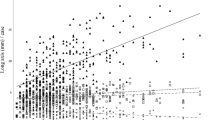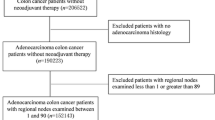Abstract
Purpose
Lymph node (LN) yield is a critical component of colon cancer staging and is often a surrogate for quality assessment in surgery. We investigated the impact of pathologists’ training on LN harvest.
Methods
This is a retrospective review on 137 patients undergoing elective colectomy for adenocarcinoma at a single institution from 2008 to 2009. We studied surgeon-, patient- and pathologist-derived factors, and identified independent variables affecting LN yield using logistic regression.
Results
LN yield was similar between open and laparoscopic resections (21 versus 23, p = 0.54). Similarly, nodal counts were independent of tumor location (p = 0.08) and no difference was noted between colorectal and general surgeons (24 versus 21, p = 0.31). Strikingly, the number of LNs reported by PGY-1 pathology residents was significantly higher than those with two or more years of training (24 versus 19, p = 0.02). On logistic regression, only the reporting pathologists’ year in training remained a significant predictor of the number of nodes reported (OR = 5.28, p = 0.0001).
Conclusions
LN retrieval in patients with colon cancer is inversely related to the interpreting pathologists’ level of training.


Similar content being viewed by others
References
O'Connell JB, Maggard MA, Ko CY (2004) Colon cancer survival rates with the new American Joint Committee on Cancer sixth edition staging. J Natl Cancer Inst 96(19):1420–1425
Le Voyer TE, Sigurdson ER, Hanlon AL et al (2003) Colon cancer survival is associated with increasing number of lymph nodes analyzed: a secondary survey of intergroup trial INT-0089. J Clin Oncol 21(15):2912–2919
Bilimoria KY, Stewart AK, Palis BE et al (2008) Adequacy and importance of lymph node evaluation for colon cancer in the elderly. J Am Coll Surg 206(2):247–254
Compton C, Fenoglio-Preiser CM, Pettigrew N, Fielding LP (2000) American joint committee on cancer prognostic factors consensus conference: colorectal working group. Cancer 88(7):1739–1757
Compton CC, Fielding LP, Burgart LJ et al (2000) Prognostic factors in colorectal cancer. College of American Pathologists Consensus Statement 1999. Arch Pathol Lab Med 124(7):979–994
Nelson H, Petrelli N, Carlin A et al (2001) Guidelines 2000 for colon and rectal cancer surgery. J Natl Cancer Inst 93(8):583–596
Goldstein NS (2002) Lymph node recoveries from 2427 pT3 colorectal resection specimens spanning 45 years: recommendations for a minimum number of recovered lymph nodes based on predictive probabilities. Am J Surg Pathol 26(2):179–189
Goldstein NS, Sanford W, Coffey M, Layfield LJ (1996) Lymph node recovery from colorectal resection specimens removed for adenocarcinoma. Trends over time and a recommendation for a minimum number of lymph nodes to be recovered. Am J Clin Pathol 106(2):209–216
Swanson RS, Compton CC, Stewart AK, Bland KI (2003) The prognosis of T3N0 colon cancer is dependent on the number of lymph nodes examined. Ann Surg Oncol 10(1):65–71
Prandi M, Lionetto R, Bini A et al (2002) Prognostic evaluation of stage B colon cancer patients is improved by an adequate lymphadenectomy: results of a secondary analysis of a large scale adjuvant trial. Ann Surg 235(4):458–463
Johnson PM, Porter GA, Ricciardi R, Baxter NN (2006) Increasing negative lymph node count is independently associated with improved long-term survival in stage IIIB and IIIC colon cancer. J Clin Oncol 24(22):3570–3575
Miller EA, Woosley J, Martin CF, Sandler RS (2004) Hospital-to-hospital variation in lymph node detection after colorectal resection. Cancer 101(5):1065–1071
Tekkis PP, Smith JJ, Heriot AG et al (2006) A national study on lymph node retrieval in resectional surgery for colorectal cancer. Dis Colon Rectum 49(11):1673–1683
Reese JA, Hall C, Bowles K, Moesinger RC (2009) Colorectal surgical specimen lymph node harvest: improvement of lymph node yield with a pathology assistant. J Gastrointest Surg 13(8):1459–1463
Johnson PM, Malatjalian D, Porter GA (2002) Adequacy of nodal harvest in colorectal cancer: a consecutive cohort study. J Gastrointest Surg 6(6):883–888, discussion 889–90
Scabini S, Rimini E, Romairone E et al (2010) Factors that influence 12 or more harvested lymph nodes in resective R0 colorectal cancer. Hepatogastroenterology 57(101):728–733
Stocchi L, Fazio VW, Lavery I, Hammel J (2011) Individual surgeon, pathologist, and other factors affecting lymph node harvest in stage II colon carcinoma. is a minimum of 12 examined lymph nodes sufficient? Ann Surg Oncol 18(2):405–412
Valsecchi ME, Leighton J Jr, Tester W (2010) Modifiable factors that influence colon cancer lymph node sampling and examination. Clin Colorectal Cancer 9(3):162–167
Nathan H, Shore AD, Anders RA et al (2011) Variation in lymph node assessment after colon cancer resection: patient, surgeon, pathologist, or hospital? J Gastrointest Surg 15(3):471–479
Buchwald P, Olofsson F, Lorinc E, Syk I (2011) Standard protocol for assessment of colon cancer improves the quality of pathology. Colorectal Dis 13(3):e33–e36
Brown HG, Luckasevic TM, Medich DS et al (2004) Efficacy of manual dissection of lymph nodes in colon cancer resections. Mod Pathol 17(4):402–406
Herrera-Ornelas L, Justiniano J, Castillo N et al (1987) Metastases in small lymph nodes from colon cancer. Arch Surg 122(11):1253–1256
Storli K, Lindboe CF, Kristoffersen C et al (2011) Lymph node harvest in colon cancer specimens depends on tumour factors, patients and doctors, but foremost on specimen handling. APMIS 119(2):127–134
Hernanz F, Garcia-Somacarrera E, Fernandez F (2009) The assessment of lymph nodes missed in mesenteric tissue after standard dissection of colorectal cancer specimens. Colorectal Dis 12(7):e57–e60
Jestin P, Pahlman L, Glimelius B, Gunnarsson U (2005) Cancer staging and survival in colon cancer is dependent on the quality of the pathologists' specimen examination. Eur J Cancer 41(14):2071–2078
Andersson Y, Frisell J, Sylvan M et al (2010) Breast cancer survival in relation to the metastatic tumor burden in axillary lymph nodes. J Clin Oncol 28(17):2868–2873
El-Gazzaz G, Hull T, Hammel J, Geisler D (2010) Does a laparoscopic approach affect the number of lymph nodes harvested during curative surgery for colorectal cancer? Surg Endosc 24(1):113–118
Jha MK, Corbett WA, Wilson RG et al (2006) Variance of surgeons versus pathologists in staging of colorectal cancer. Minerva Chir 61(5):385–391
West NP, Hohenberger W, Weber K et al (2010) Complete mesocolic excision with central vascular ligation produces an oncologically superior specimen compared with standard surgery for carcinoma of the colon. J Clin Oncol 28(2):272–278
Hohenberger W, Weber K, Matzel K et al (2009) Standardized surgery for colonic cancer: complete mesocolic excision and central ligation–technical notes and outcome. Colorectal Dis 11(4):354–364, discussion 364–5
Disclaimers
None.
Author information
Authors and Affiliations
Corresponding author
Rights and permissions
About this article
Cite this article
Bamboat, Z.M., DePeralta, D., Dursun, A. et al. Factors affecting lymph node yield from patients undergoing colectomy for cancer. Int J Colorectal Dis 26, 1163–1168 (2011). https://doi.org/10.1007/s00384-011-1240-6
Accepted:
Published:
Issue Date:
DOI: https://doi.org/10.1007/s00384-011-1240-6




